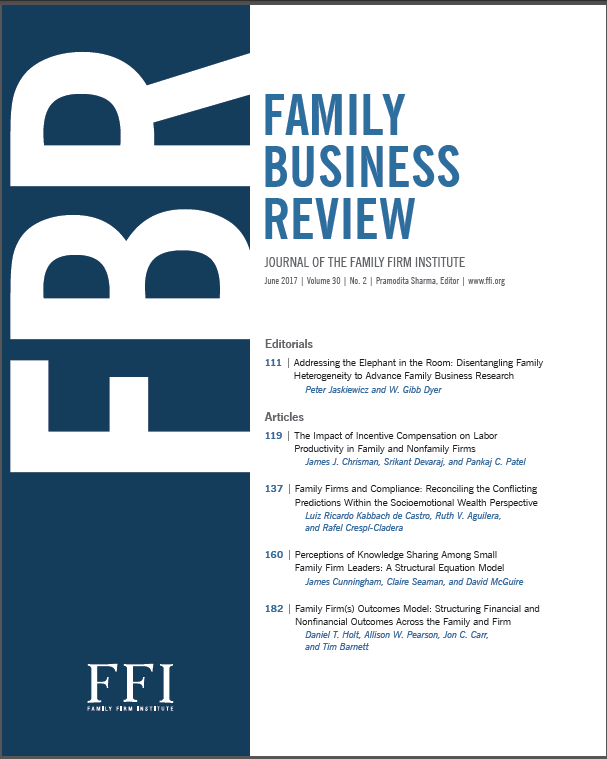Construals Matter: Painting the Big Picture or Drawing the Brushstrokes of the Family Firm
IF 9.9
1区 管理学
Q1 BUSINESS
引用次数: 10
Abstract
Over the past few years, scholars have increasingly called for a shift of focus in family business research from a macro view to one that studies micro foundations (e.g., De Massis & Foss, 2018), which investigate individual-level constructs such as emotions (e.g., Shepherd, 2016), identity (e.g., Deephouse & Jaskiewicz, 2013), or attitudes (e.g., Ramos, Man, Mustafa, & Ng, 2014). In particular, there is much potential for integrating theoretical and empirical insights from psychology to further advance our knowledge on family businesses by better understanding the decision making of family members and specifically owner-managers of family firms. In this regard, a recent systematic review on family firm advisors (Strike, Michel, & Kammerlander, 2017) has revealed that family firm research focusing on the individual level has developed largely independently of research in the field of psychology and, as such, has forgone important opportunities to integrate psychological perspectives into family firm research. Moreover, the specific setting of the family firm in which professional and family lives are closely intertwined has the potential to inform other fields and challenge traditional perspectives, such as work in organizational psychology on work–family balance (e.g., Valcour, 2007), work on entrepreneurial role models (e.g., Bosma, Hessels, Schutjens, Praag, & Verheul, 2012), or work on managerial goal setting (e.g., Bateman, O’Neill, & KenworthyU’Ren, 2002). Consequently, it is not surprising that scholarly calls have aimed to encourage more interdisciplinary work to advance our knowledge on family firms. As a current example, de Massis, Piccolo, Picone, and Tang are editing a Family Business Review special issue on “Psychological Foundations of Management in Family Firms.” While recent studies represent commendable, early achievements, we suggest that understanding the cognitions of the people in (and supporting) family firms still represents a rather untapped potential to broaden our insights into interesting idiosyncrasies that stem from family owner-managers’ cognition. Specifically, these insights will shed light on drivers of heterogeneity in family firms, for example, in their goals or long-term orientation (Diaz-Moriana, Clinton, Kammerlander, Lumpkin, & Craig, 2018). This editorial emerged from a discussion of a family business scholar with a strategy background and an entrepreneurship scholar with a major in psychology sitting together and reflecting about the nature of family business and their idiosyncrasies. As an outcome of these inspiring, interdisciplinary discussions, we realized that family business owner-managers might perceive or construe their family business in a particular way and that such perception might explain both, differences between family versus nonfamily firms as well as heterogeneity among family businesses. The aim of this editorial is hence to briefly introduce a promising psychological theory to the research studying family businesses and business families and to stimulate further research in this and related research fields. We also want to encourage family firm researchers to seek more collaboration with researchers from other fields, such as psychology, in order to identify and integrate other promising theories.识解很重要:描绘家族企业的大图景或画出家族企业的笔触
在过去的几年里,学者们越来越多地呼吁将家族企业研究的重点从宏观角度转移到研究微观基础的角度(例如,De Massis&Foss,2018),后者研究个人层面的结构,如情绪(例如,Shepherd,2016)、身份(例如,Deephouse和Jaskiewicz,2013)或态度(例如,Ramos、Man、Mustafa和Ng,2014)。特别是,整合心理学的理论和实证见解,通过更好地理解家族成员的决策,特别是家族企业的所有者-管理者的决策,进一步提高我们对家族企业的认识,有很大的潜力。在这方面,最近对家族企业顾问的一项系统综述(Strike,Michel,&Kammerlander,2017)表明,专注于个人层面的家族企业研究在很大程度上独立于心理学领域的研究而发展,因此,放弃了将心理学观点融入家族企业研究的重要机会。此外,职业和家庭生活紧密交织在一起的家族企业的特定环境有可能为其他领域提供信息,并挑战传统观点,如组织心理学中关于工作-家庭平衡的工作(例如,Valcour,2007),创业榜样的工作(例如,Bosma、Hessels、Schutjens、Praag和Verheul,2012),或从事管理目标设定工作(例如,Bateman,O'Neill,&KenworthyU'Ren,2002)。因此,学术呼吁旨在鼓励更多的跨学科工作,以提高我们对家族企业的认识,这并不奇怪。例如,de Massis、Piccolo、Picone和Tang正在编辑《家族企业评论》特刊《家族企业管理的心理基础》,我们认为,理解(和支持)家族企业的人的认知仍然代表着一个相当未开发的潜力,可以拓宽我们对源自家族所有者-管理者认知的有趣特质的见解。具体而言,这些见解将揭示家族企业异质性的驱动因素,例如其目标或长期方向(Diaz Moriana,Clinton,Kammerlander,Lumpkin,&Craig,2018)。这篇社论来自一位具有战略背景的家族企业学者和一位主修心理学的创业学者的讨论,他们坐在一起思考家族企业的本质及其特质。作为这些鼓舞人心的跨学科讨论的结果,我们意识到家族企业主管理者可能会以一种特定的方式感知或解释他们的家族企业,这种感知可能会解释家族企业与非家族企业之间的差异以及家族企业间的异质性。因此,这篇社论的目的是简要介绍一种有前景的心理学理论,用于研究家族企业和企业家族,并促进这一领域和相关研究领域的进一步研究。我们还希望鼓励家族企业的研究人员寻求与心理学等其他领域的研究人员进行更多的合作,以确定和整合其他有前景的理论。
本文章由计算机程序翻译,如有差异,请以英文原文为准。
求助全文
约1分钟内获得全文
求助全文
来源期刊

Family Business Review
BUSINESS-
CiteScore
12.40
自引率
13.60%
发文量
13
期刊介绍:
Family Business Review (FBR) has been a refereed journal since 1988, serving as the premier scholarly publication dedicated to the study of family-controlled enterprises. It delves into the dynamics of these businesses, encompassing a range of sizes from small to very large. FBR concentrates not only on the entrepreneurial founding generation but also on family enterprises in subsequent generations, including some of the world's oldest companies. The journal also publishes interdisciplinary research covering families of wealth, family foundations, and offices.
 求助内容:
求助内容: 应助结果提醒方式:
应助结果提醒方式:


